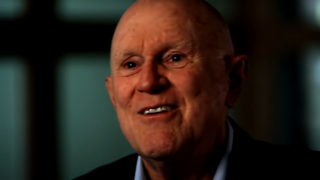PC pioneer Gordon Bell has passed away at 89 years old
One of the people who made sure you don't need an entire room to store your PC tower

C. Gordon Bell, a pioneering researcher and engineer in computing, died on May 17 due to pneumonia at his home in Coronado, California. He was 89 years old. His groundbreaking technical achievements, as well as his efforts with the Computer History Museum, followed recurring health issues from birth.
Among his many achievements, one of the first and most major would have to be his contributions to the world's first "minicomputers" in the 60s, which are bulky by today's standards but were orders of magnitudes smaller than the room-sized mainframe PCs typical of that era. He helped work on Digital Equipment Corporation's PDP-1, PDP-4, and PDP-6— PDP-1 also known today as the PC on which Spacewar!, the first-ever video game, was played.
Besides his contributions to the PDP minicomputers, Bell is also known for co-founding the Computer History Museum and leading several Microsoft research projects, including the likes of MyLifeBits, which was Gordon Bell's 2000s take on digitally archiving every piece of his life possible, well before the days of Twitter ('06), Google Glass, or unwanted Copilot additions.
Bell received various honors from the computing community, including the IEEE John von Neumann Medal, the National Medal of Technology and Innovation, and recognition as a member of organizations like the American Association for the Advancement of Science and the National Academy of Engineering. He also founded both Encore Computer and Ardent Computer, known for parallel computing and graphics-centric supercomputing, respectively.
When Bell was a small child, he was known to have struggled with health problems that regularly confined him to his home and his bed, but didn't prevent him from becoming a professional electrician at age 12. He also suffered two separate heart attacks in his adult life.
Fortunately, none of that stopped Bell from helping make computing history as an academic, technologist, and archivist, and computing is better for it.
Stay On the Cutting Edge: Get the Tom's Hardware Newsletter
Get Tom's Hardware's best news and in-depth reviews, straight to your inbox.

Christopher Harper has been a successful freelance tech writer specializing in PC hardware and gaming since 2015, and ghostwrote for various B2B clients in High School before that. Outside of work, Christopher is best known to friends and rivals as an active competitive player in various eSports (particularly fighting games and arena shooters) and a purveyor of music ranging from Jimi Hendrix to Killer Mike to the Sonic Adventure 2 soundtrack.
-
abufrejoval The crucial differencee between Gordon Bell's take on MyLifeBits and Co-Pilot is that the first was to empower you, the user of these computing resources, give you the benefits of perfect recall, augmenting your abilities. What corporate giants are creating, however, is all about empowering them to squeeze more money from you via an illusion of value that is mostly aimed at making you dependent and addicted.Reply
It's quite simply where the money is so you don't have to even postulate subversive intent on their part: even the most "don't do evil" oriented company will just naturally steer in that direction, because money exerts gravity and more money changes how humans and computers move relative to each other.
"My" first PC was a PDP-11, actually a DEC Professional 350 that sat on my home desk for a few month and unfortunately only as a loan, while I did work for a bigger PDP-11 at the office. Going back from that multi-tasking machine to x86 PCs on DOS was so traumatic, that I tried to escape via Unix as early as on a 80286, when Microport's System V Rel 2 simply wasn't ready yet for prime time and the compiler often spew out random garbage. Boy was I happy when I finally got my own VAX via an 80386, although it was always kept somewhat short of what VAXes could do until Mendel Rosenblum and Diane Greene forced Intel to include hardware VM support into x86.
I've also always been a history buff and Gordon's wonderful videos on the early history of computing were just top notch. His interview where Ken Olson, the DEC founder, confesses having messed up on the PC, just showed the big souls and humility these guys had. And arguably opting for ECL vs CMOS might have been worse. Today's IT leaders seem robotic maniacs or worse in comparison. -
AlskiOnTheWeb A true pioneer. The entire PDP line was amazing in comparison to everything else that was available at the time.Reply
Most Popular





